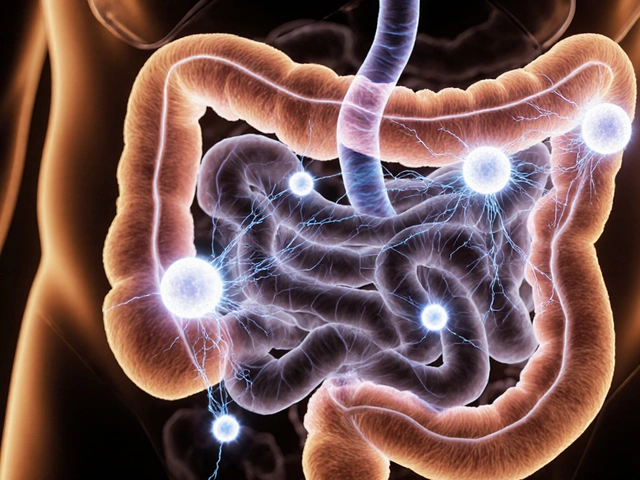Your digestive system does more than just process food. In recent years, science has uncovered the deep connection between gut health and the well-being of your entire body. A healthy gut can positively influence your mind, immunity, and energy levels.
It's fascinating to realize that trillions of microorganisms in your intestines play a massive role in keeping you healthy. These include bacteria, viruses, and fungi, known collectively as the gut microbiome. These tiny inhabitants help break down food, produce essential nutrients, and guard against pathogens.
When the balance of these microorganisms is disrupted, it can lead to various problems, from digestive issues to more serious health conditions. Research shows that a healthy gut can influence everything from our immune system to our mood.
This article will explore how your gut communicates with your brain, its impact on your immune system, the foods that nurture a healthy microbiome, and practical tips to maintain a balanced and thriving gut.
- The Gut-Brain Connection
- Impact on Immune System
- Diet and Gut Health
- Practical Tips for a Healthy Gut
The Gut-Brain Connection
It may come as a surprise that your digestive system and brain are inextricably linked. This connection is known as the gut-brain axis, a system where your central nervous system and gastrointestinal tract communicate. This relationship plays a vital role in your physical and mental health. For example, have you ever experienced a gut-wrenching feeling when anxious or stressed? This is an example of the gut-brain connection in action.
Research shows that your gut produces a range of neurotransmitters, the chemicals that your brain uses to communicate. Around 90% of the body's serotonin, a neurotransmitter that stabilizes mood, is produced in the gut. This means that the health of your digestive tract can significantly influence your psychological well-being. A diverse microbiome can potentially translate into a more stable and happier mind.
Through the vagus nerve, a major nerve that connects your gut and brain, these microorganisms can send signals directly to your brain. This continuous communication can impact everything from how your immune system responds to stress, how your body absorbs nutrients, and your mental clarity. Fascinatingly, studies suggest that nurturing your gut health can reduce symptoms of anxiety and depression.
"The gut is the second brain," says Dr. Michael Gershon, a professor at Columbia University and one of the first researchers who studied the gut-brain connection.
Scientists have also found that conditions like irritable bowel syndrome (IBS), a disorder marked by chronic stomach pain, bloating, and irregular bowel movements, are linked to mental health. This condition often coexists with anxiety and depression, highlighting how intertwined these systems are. Maintaining a healthy gut might be one of the essential routes to maintaining a healthy brain.
It's not only neurotransmitters that the gut influences. The microbiome can also create short-chain fatty acids (SCFAs) through the fermentation of dietary fibers. These SCFAs can cross into the brain and influence different aspects of brain function. This could include memory, learning, and mood regulation.
Understanding this profound connection shows just how crucial maintaining a healthy gut is. Balancing your gut flora can be beneficial in numerous ways, from better digestion to improved cognitive functions and emotional stability. Pay attention to your gut, literally. Eating a diet rich in diverse, fibrous foods, reducing stress, and staying physically active can help maintain this delicate balance.
Regularly including probiotic-rich foods like yogurt, kefir, and fermented vegetables into your diet can foster a thriving microbiome. These foods help introduce beneficial bacteria to your gut, promoting a healthy digestive system. Don't forget prebiotics, the fibers that good bacteria feast on, found in foods like garlic, onions, and bananas. They're essential for sustaining the beneficial microbes already present in your gut.

Impact on Immune System
Your immune system is your body's defense against harmful invaders like bacteria, viruses, and toxins. What many people don't realize is that a significant portion of your immune cells actually reside in your gut. This makes your digestive system a major player in determining your body's immune responses. The gut-associated lymphoid tissue (GALT) is rich in immune cells, continuously interacting with the trillions of microorganisms in your intestines.
Gut bacteria help educate your immune cells, teaching them to distinguish between what is harmful and what is not. A well-balanced gut can fend off infections more effectively and manage inflammation better. Interestingly, about 70% of your immune system is housed in your gut, highlighting its crucial role in maintaining your health.
Modern research has shown that an unhealthy gut can compromise your immune system, leading to increased susceptibility to infections and even autoimmune diseases. Dysbiosis, or the imbalance of gut microbes, is linked to conditions such as Crohn's disease and ulcerative colitis. Moreover, it can also trigger systemic inflammation, which is a root cause of numerous chronic diseases like diabetes and heart disease.
According to Dr. Alessio Fasano, an expert in pediatric gastroenterology, “The gut is not like Las Vegas. What happens in the gut doesn't stay in the gut.” His words underscore the far-reaching impact of gut health on your body's systems.
A growing body of evidence suggests that improving gut health can enhance immune function. Probiotic supplements, which introduce beneficial bacteria to your gut, have been shown to boost immune response in several studies. For example, a study in the journal Pediatrics found that children who took probiotics had fewer and less severe upper respiratory infections.
Feeding your gut with prebiotic-rich foods like garlic, onions, and bananas can also support your immune system. Prebiotics are types of dietary fiber that feed the good bacteria already present in your gut, helping them thrive and multiply. This symbiotic relationship between diet, gut health, and immunity is something you can control and improve.

Diet and Gut Health
The connection between what you eat and your gut health is undeniable. The food you consume directly affects the makeup and function of your gut microbiome. Eating a diverse range of whole foods is vital for nurturing a healthy gut. These foods provide the nutrients and fiber that beneficial microorganisms need to thrive.
One key aspect of maintaining gut health is incorporating a variety of plant-based foods into your diet. Fruits, vegetables, legumes, nuts, and seeds are rich in dietary fiber, which acts as a prebiotic. Prebiotics are compounds that stimulate the growth of beneficial bacteria. For example, bananas, onions, garlic, and asparagus are excellent sources of prebiotics.
Fermented foods are another cornerstone of a gut-friendly diet. These foods have undergone a process of lacto-fermentation, which promotes the growth of probiotics—live beneficial bacteria. Common fermented foods include yogurt, kefir, sauerkraut, kimchi, and miso. These foods can help restore balance to your gut microbiome and improve digestive health.
"A healthy gut microbiome is crucial for supporting the immune system, metabolizing nutrients, and even influencing mood," says Dr. David Perlmutter, a renowned neurologist and author.
Avoiding processed foods is equally important. High-sugar, high-fat, and low-fiber foods can disrupt the balance of your gut bacteria. Processed foods often contain additives and preservatives that can negatively impact your microbiome. Aim to limit your intake of fast food, sugary snacks, and sodas.
Hydration also plays a role in gut health. Drinking plenty of water helps with digestion and supports the mucosal lining of the intestines. This lining is essential for the absorption of nutrients and maintaining a barrier against harmful substances.
Some studies suggest that a diet rich in polyphenols can benefit the gut. Polyphenols are compounds found in foods like berries, dark chocolate, and green tea. They have antioxidant properties and may increase the number of beneficial bacteria in your gut.
Lastly, incorporating a variety of spices and herbs can have positive effects. Ginger, turmeric, and peppermint can help with digestion and have anti-inflammatory properties. Experimenting with these ingredients can add flavor to your meals while supporting gut health.

Practical Tips for a Healthy Gut
Maintaining gut health can seem daunting, but it doesn't have to be. Small, consistent changes can make a big difference. One of the most impactful actions you can take is focusing on dietary adjustments. Incorporating more fiber-rich foods such as fruits, vegetables, and whole grains into your daily meals provides your gut bacteria with the nutrients they need to thrive. Fiber acts as a prebiotic, a type of food that feeds the good bacteria in your gut.
Another essential element is staying hydrated. Drinking plenty of water aids digestion and can help maintain the balance of good bacteria in your gut. Aim to drink enough water daily, which can vary based on your activity level and climate. Herbal teas and broths are also beneficial for keeping hydrated and providing additional nutrients.
Regular exercise plays a crucial role in gut health. Physical activity increases blood flow to your intestines, encouraging the growth of various bacterial strains. Aim for at least 30 minutes of exercise most days of the week. Choose activities you enjoy to make it easier to stick to your routine.
Managing stress is another vital aspect. Chronic stress can negatively impact your gut microbiome. Explore stress-reducing activities like yoga, meditation, or even simple deep-breathing exercises. Developing a regular practice can help lower stress levels and improve gut health.
"The gut is not like Las Vegas. What happens in the gut does not stay in the gut." - Alessio Fasano, M.D., a renowned specialist in pediatric gastroenterology.
Limiting the use of antibiotics and non-essential medications can also preserve the delicate balance of your gut flora. Antibiotics can wipe out broad swathes of bacteria, both harmful and beneficial. Whenever prescribed antibiotics, it’s helpful to consume probiotic-rich foods or supplements to replenish your gut microbiome.
Speaking of probiotics, incorporating foods like yogurt, kefir, sauerkraut, and kimchi can significantly boost the number of good bacteria in your intestinal tract. These fermented foods introduce live cultures into your system, aiding digestion and enhancing nutrient absorption.
Quality sleep is often overlooked yet highly vital for gut health. Aim for 7-9 hours of restful sleep each night. Poor sleep can disrupt your gut microbiome, so developing a regular sleep schedule and creating a relaxing bedtime routine can be incredibly beneficial.







